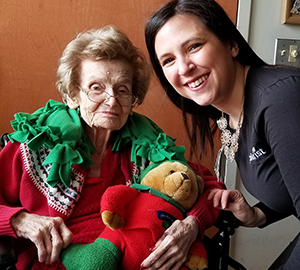Portable Hugs and Gilchrist Social Workers Ease Emotional Distress
March is National Social Work Month

There are many people to be honored during Social Work Month. Say social worker and many people think of homeless shelters, adoption agencies, welfare offices and hospitals. But you also find social workers at student counseling centers, employee assistance programs, on disaster relief teams, and here at Gilchrist.
As social workers, we are trained to understand the psychological and social factors which underlie people’s thoughts, feeling and behaviors. For those facing a terminal illness, the challenges may seem overwhelming. Gilchrist social workers counsel our patients and families through these emotional and problem-solving challenges by empowering them, engendering hope and reducing distress using the best practices available.
Training and Continuing Education
All Gilchrist social workers have a master’s degree from an accredited school of social work and are licensed by the State of Maryland to provide counseling and support. We are continually meeting to enhance our skills and to share and learn from others. For example, four Gilchrist social workers—Kim Flash, Jenny Lazzaro, Meara Strain and Kellie McLellan—recently made a presentation at the annual conference of the Hospice and Palliative Care Network of Maryland, titled “Addressing Emotional Distress: The Value of a Clinical Case Review Group in Hospice.” They reviewed many of the evidence-based practices we rely on using verbal interactions with patients.
But what happens when a patient is no longer able to converse? Always working to meet the needs of every patient, Gilchrist social worker Elizabeth Zuravel has just completed phase one of a clinical trial called Portable Hugs—a new and unique way to ease the stress and anxiety of patients who no longer converse. This method can be a big comfort to these patients and their loved ones.
Portable Hugs
Portable Hugs are small weighted devices that sit on the shoulders of a person. The ‘hugs’ help to decrease external stimuli and foster a calming response to decrease emotional distress and anxiety. In other words, Portable Hugs help to provide support when words are not sufficient.
Gilchrist has been trialing Portable Hugs within the community in recent months, with great success. For example, a Gilchrist patient living in a residential care center had become blind, deaf and frequently confused due to the progression of her disease. This confusion brought severe anxiety, leading her to cry out. When her social worker placed the Portable Hug on the patient’s shoulders, the change was immediate. She began to calm down, her breathing slowed and became even, and she let out a deep sigh of relief.
Gilchrist is now working on Phase II of the trial to make Portable Hugs available to more patients who could benefit.
Emotional distress can occur anywhere, at any time. Gilchrist social workers are working every day to sharpen our skills and expand the ways we can help. Our team helps fulfill Gilchrist’s goal of providing counseling, support and care to people at every stage of serious illness, wherever they call home.
Learn more about Gilchrist social workers here.


